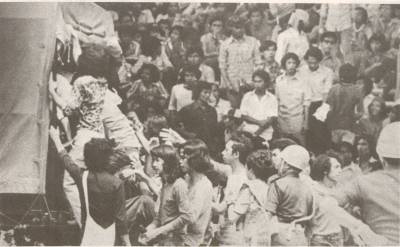THE
STUDENT MOVEMENT IN MALAYSIA,
1967-74 Hassan Karim
1969: A Year of Upheaval
Student became increasingly involved in national politics from 1969. In the months of April and May, before the May General Elections, PMUM held several public rallies throughout the country.
As many as 13 rallies were held, with a total attendence of 100,000 people. Over 100,000 PMUM manifestoes were distributed at these'rallies.
The contents of the PMUM manifesto for 1969 are important as they represent the issues that students were then championing.
Democracy was an important element in the manifesto as students wanted the people to be more involved in the decesion-making processes and for national politics to be truely based on democracy.
They demanded that freedom and justice be guaranteed, an improvement of the economic status of the people, land reform and a truely national education policy.
Students also demanded the unconditional release of all political detainees and called for the withdrawal of foreign military bases on Malaysian soil.
The demands of the 1969 PMUM manifesto clearly reflect the progressive character of the student movement then, which had also become a political force to be reckoned with.
The government was unhappy over the good response the rallies received in several big towns, and disallowed students from holding rallies in towns, particularly on the East Coast.
The rallies organised by UMSU were an important development in the history of the student struggle. It involved a direct involvement by students in the political process in Malaysia.
Students raised the issues of democracy and social justice, and STUDENT MOVEMENT TODAY 5 denounced political parties that capitalized on racial issues. Students who were socialists formed the backbone of these UMSU rallies.
After May 13 : The Campaign to Topple the Tunku
The period after May l3th was one of great challenges. In the aftermath of May l3th a campaign to replace Tunku Abdul Rahman, the Malaysian Prime Minister erupted.
 In
this heated campaign, students particulary Malay students urged the Tunku
to step down. The students were
In
this heated campaign, students particulary Malay students urged the Tunku
to step down. The students were
forthright and brave in their demands.
A series of demonstrations were held within the campus as part of this campaign. UMSU, led by Syed Hamid Ali, and the PBMUM, led by Anwar Ibrahim, played important roles in this cam~paign against the Tunku.
The efforts of the students were not in vain, and finally the Tunku was forced to relinguish his Prime Ministership. Historically, the fall of the Tunku was connected in no small way, with the opposition of students to his continued leadership.
In fact Syed Hamid Ali and Anwar Ibrahim had different reasons for wanting to see the last of the Tunku Anwar Ibrahim's opposition was mainly based on the Tunku's and not on the weaknesses of the system of government led by the Tunku.
He felt that the Tunku had conceded too much to the Chinese Community and had not endeavoured enough to overcome the problem of the Malay Community. He saw the Tunku as failing to advance the status of Bahasa Malaysia sufficiently and the implementation of the National Education Policy.
Anwar at no time actually opposed the system of government led by the Tunku. Syed Hamid Ali and the Socialist Club, on the other hand, were particularly opposed to the Tunku's political, and economic, and social policies.
The socialist students opposed the capitalist system, which they saw as being the root cause of poverty.
They were opposed to the influx of foreign investment, which still dominated the economy and wealth of the country and left the majority of the rakyat living in poverty and misery.
They also felt that it was his leadership that had led to racila riots. Students And University Autonomy On the 29th August 1969, police invaded the University of Malaya campus with the intention of disrupting an anti-Tunku demonstration. This was the first time that the police had ventured on to the campus to disrupt student activities. Several students, involving Syed Hamid Ali, then UMSU president were detained. The students protested against the police action, emphasizing that it was a violation of university autonomy.
In the years following, students have always opposed attempts by the government to encroach upon university autonomy.

